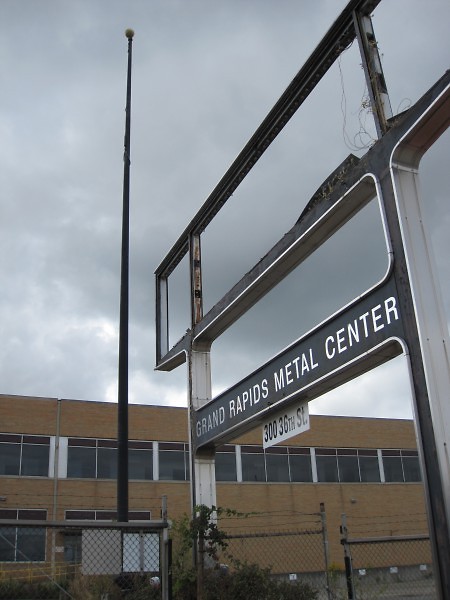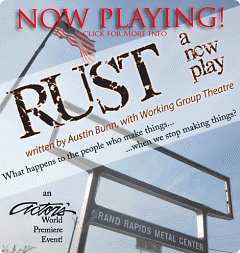Marty Green started his manufacturing career at the General Motors Metal Fabrication plant on 36th Street in Wyoming in 1985. Although he experienced some bumps along the way by way of short-lived layoffs, he still enjoyed his time at GM.
“The work ethic was great, and the plant was the number one low cost producer,” he said.
The two million square foot plant first opened its doors in 1936, and became one of GM’s most productive stamping plants before closing its doors after 73 years in 2009.
Marty worked for GM for 27 years. He was one of 1,500 from the plant that either retired, transferred or were laid off. He said the GM employees were very fortunate; many manufacturing workers in Grand Rapids were not as lucky.
During Marty’s time at the plant, the industry drastically changed. “Back then [in 1985], you are talking about 60% efficiency, so you had way more labor intensive work. Now, you are talking about 80-90% efficiency,” Marty said, referring to the mechanization of the assembly process. “If you go into an assembly plant now, it’s very few people. When you look at the size of the operation it’s very few people and robots everywhere.”
As the years went on, Marty noticed that the makeup of the plant became less and less local.
“We took in a lot of people from other plants. So as far as the plant was pure Grand Rapidians when we first started, by the time we closed there were a lot of transplants from other plants. I think every GM plant in the nation is seeing that. You’re not having your pure hometown workforce anymore.”
Like Marty Green, Gary Albrecht also worked in manufacturing for several decades but at jukebox manufacturer Rowe International until 2009 when they moved their operations to Mexico.
Gary’s dad worked at Rowe International, and Gary followed suit in 1979. He dropped out of high school and stuck with the plant for 30 years.
“When I first started, I was employee number 308, and there was probably another 300 in management. They probably hired another 300 after me within six months. They were booming. There were people literally on top of each other. We couldn’t make jukeboxes and bill changers fast enough.”
Gary said Rowe International was a good company. They paid good wages and treated their employees well. “It was one big family in reality.”
However, Gary said that demand for their products dropped. “Bill changers aren’t everywhere. Vending machines, the places where those were—the cafeterias and the factories—those places aren’t there anymore. A lot of the market shrunk. The vending machine market was huge. Jukeboxes, for a while, we were making 100 a day. Then in comes the digital age.”
Gary watched Rowe International try to automate the plant to reduce cost and adjust to changing demand. “Every time we tried to automate things, they didn’t have the money to do it right, so it never worked really well.”
Even though he had been at Rowe International for 30 years, Gary was one of the youngest employees at the plant when it closed. He had to do something that he hadn’t done in three decades when the plant closed: search for a new job.
“So you’re 50 years old, your job’s gone, you have to get retraining. I can’t just go in and take computer classes. I have to take math, I have to take English. And I’m really glad I did.”
Gary was able to take advantage of tax-funded programs specifically designed for displaced manufacturing employees. “Because my job went to Mexico, I can go to school under the NAFTA laws that were passed. So I took advantage. I got my GED. I went to GRCC for a six month program called the 'Career Advancement Program.'” Gary is now attending Davenport University to study computers. His office at his home is filled with computer screens and hard drives that he is fixing.
“At first I thought I was going to be this old guy walking the hallway. But there are a lot of guys walking the hallways. For the most part, I get along with the kids and I’ve made a lot of new friends.”
According to a report from Grand Valley State University’s Community Research Institute, Michigan lost over 50% of its auto manufacturing jobs, 179,000 jobs between 1998-2008. The other 49 states combined lost 253,000 jobs during that same period.
George Erickcek, Senior Regional Analyst for the W.E. Upjohn Institute for Employment Research, says most of these jobs aren’t coming back. According to Erickcek, manufacturing is becoming more productive, moving off shore to meet the demand of off-shore markets while US consumption is shifting toward services
“This has been a slow drain on manufacturing.” He adds, “It’s not something that is new. When you look at the auto industry, the peak was 1979. So it is a transition that has been going on for quite some time.”
Analysts and former employees aren’t the only ones to feel the absence. Austin Bunn, an actor, playwright and creative writing professor at GVSU, couldn’t help but notice the economic contraction when he moved to Grand Rapids from New Jersey.
“It’s hard to live in Michigan and not notice the empty storefronts. People have moved on. It looks like it got big and then it got small,” Bunn said. “So I had this idea to do something about the collapse of certain industries…something about the downturn in the economy.”
Bunn’s idea blossomed into "RUST," a play written he wrote with Working Group Theatre that is opening at Actors’ Theatre (160 Fountain NE) on Sept. 29.
“I had this idea to interview people at the GM plant.”
The play is billed on the Actors’ Theatre website as “a young playwright on a voyage of discovery—and rediscovery—as he attempts to portray those affected by the close of the plant.”
Bunn says the play is a metaphor around reconstructing a life. He cites several interviews with auto workers that portrayed a changing industry in the face of a changing consumer culture. He quoted one interviewee as saying, “Americans are not interested in how things are made anymore, they are interested in how things are bought.”
One person Bunn interviewed recently had surgery to remove cancer from his spine. However, Austin said, “when he had surgery, he went back to work the next Monday. It was like he wasn’t going to recuperate here at home. It was more like 'I want to work. When I die, I want to be at my machine working.’”
Bunn thinks there is a generation gap between the industry workers he interviewed and many entering the work force now.
“They may be the last generation that works in the car industry. None of their kids work in the car companies anymore. If you think about the generations that worked in the car companies before them—also, just the values—loyalty for a company for 30 years?”
According to Erickcek, although manufacturing has permanently lost an extraordinary amount of jobs through this recession, the industry still has more jobs than a year ago.
“[Manufacturing] still needs more and more experienced and trained workers in terms of welders and machinists, but it is more difficult to attract young adults into the training for manufacturing because the outlook is not very promising.” He added, “If you are more technical and more advanced, than you might have more options than manufacturing. So the question is why would you step into a manufacturing environment?”
For Gary and Marty, they have an opportunity to see how their transition is portrayed on stage since both were interviewed by Bunn for "RUST." They are excited to attend the play and have even invited family to the opening night.
“I’m certain that Austin will be creative with the story, and I’m excited to see his take on things,” Gary said. “It’s always good to see how others see you and your situation.”
One thing he hopes that "RUST" conveys is “that displaced workers have to find a way to gain the newer skills that today’s manufacturers or employers are seeking. I feel that training is the key.”
Erickcek also believes retraining is vital for displaced manufacturing employees, and not just retraining in general but finding the right kinds of retraining for these workers.
“Bottom line, when you think about people who made this tremendous transition, there has to be something that is still interesting to them. You hate to see people make decisions just because that’s where the jobs are. You don’t want to train for a job that you hate the rest of your life.”
The Rapidian, a program of the 501(c)3 nonprofit Community Media Center, relies on the community’s support to help cover the cost of training reporters and publishing content.
We need your help.
If each of our readers and content creators who values this community platform help support its creation and maintenance, The Rapidian can continue to educate and facilitate a conversation around issues for years to come.
Please support The Rapidian and make a contribution today.



Comments
and thanks for the thoughful, thorough write-up. So glad you got a chance to talk to Marty and Gary -- such great guys. And both are in the show!
Thanks, Austin. I look forward to seeing the play tomorrow. Joel Van Kuiken and I are planning to connect with Gary and Marty tomorrow after the show to get their responses to the show via video. So hopefully there will be a part II to this piece!
great article Jeremy. really enjoyed learning their stories. you completely pulled me in.
The transition Gary and Marty are going through, much like many of the nearly 200,000 who lost their jobs (or are waiting to hear), is an incredible shift. It's definitely an important issue for this community, and something that I hope we continue to place high on our agenda to address in public policy.